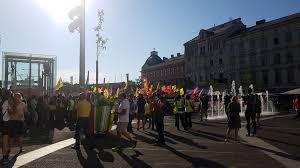(Reuters) – Austria pledged on Monday to find out who was behind clashes between Kurdish and Turkish protesters in the Austrian capital last week that have further strained already tense relations between Vienna and Ankara.
The Turkish Foreign Ministry strongly criticised Austria’s handling of the protests, which it said were by groups linked to militants of the outlawed Kurdistan Workers Party (PKK).
“Austria’s ambassador to Ankara will be invited to our ministry and informed of our concern,” it said, accusing Austrian security forces of meting out “harsh” treatment to the Turkish protesters.
Austria’s Foreign Ministry said over the weekend it would also summon Turkey’s ambassador on Monday.
The trouble erupted last Wednesday when Turks heckled a Kurdish gathering in Vienna, police said. Kurdish protests on Thursday and Friday with around 300 people led to clashes with Turkish counter-protesters in which stones and fireworks were thrown, said the police, who were also attacked with metal bars.
“It is completely unacceptable for Turkish conflicts to be carried out on Austrian territory,” Interior Minister Karl Nehammer told a news conference, adding that both sides had attacked the police.
“We will look very precisely at who was behind this escalation during these recent demonstrations.”
“It would be unacceptable if it turns out that Turkish groups on Ankara’s orders, so to speak, are causing destabilisation in Austria,” Nehammer added.
Police fined some counter-demonstrators for using a banned hand gesture associated with the Grey Wolves, a Turkish nationalist group. In total, 11 arrests were made and seven police officers injured, Nehammer said.
Austria has a large ethnic Turkish minority but conservative Chancellor Sebastian Kurz is an outspoken critic of Turkey’s President Tayyip Erdogan.
PKK militants have been waging an insurgency against the Turkish state in mainly Kurdish southeast Turkey since 1984 in a conflict that has claimed more than 40,000 lives.
The PKK is designated a terrorist group by Turkey, the European Union and the United States.
Turkey also at loggerheads with Macron
Turkey has criticised France’s remarks on Ankara’s support for the internationally recognised government in Libya, saying Paris aims to restore old colonial rule in the North African country.
The biting comments came days after French President Emmanuel Macron launched a furious verbal attack on Turkey’s conduct in war-ravaged Libya, accusing it of playing a “dangerous game” that can no longer be tolerated.
In an interview on Wednesday, Turkish Foreign Minister Mevlut Cavusoglu said: “France is attempting to divide Libya. It wants to go back to old colonial times.”
The oil-rich country is split between rival administrations in the east and west, with the conflict recently attracting increasing foreign involvement.
France, the United Arab Emirates (UAE), Egypt and Russia support the eastern-based House of Representatives allied with renegade military commander Khalifa Haftar.
Bigger trouble ahead on tourism
Turkish foreign minister is to be joined by the tourism minister on a trip to Germany on Thursday to discuss the European nation’s decision to classify Turkey as risky for travel due to the COVID-19 outbreak in an attempt to convince Berlin to change its stance, diplomatic sources said.
According to sources, Foreign Minister Mevlüt Çavuşoğlu and Tourism Minister Mehmet Nuri Ersoy, accompanied by a team from the country’s health ministry, will meet German FM Heiko Maas and German Economy Minister Peter Altmeier.
During the meeting, the Turkish side is expected to present the government’s new “healthy tourism program” that requires the implementation of strict health and hygiene measures at touristic facilities, including hotels, airports, museums and restaurants.
Ersoy earlier said he would share updates on the country’s COVID-19 figures during his Germany trip to show Turkey is a safe destination for Germans.
Germany announced a travel warning in place until Aug. 31 for more than 160 countries outside the European Union in mid-July. The German government, along with 130 other countries, also classified Turkey as a coronavirus risk area.
Turkish authorities have described the decision as “disappointing” and have called on Berlin to change its stance. Çavuşoğlu said that there was no “scientific reason” behind the travel warning against Turkey.
Turkey is the third most popular holiday destination for Germans after Spain and Italy. In 2019, having last year hosted more than 5 million visitors from Germany, an 11.4% year-on-year increase, according to government data.
The country’s tourism industry representatives labeled German government’s travel warnings as “political,” noting that Turkey had drawn a better picture compared to several EU countries such as Spain, Italy, and France in terms of the operability of the health system, the adequacy of the test capacity, hygiene rules, opportunities for return and measures taken for tourists’ safety.
“We don’t find it comprehensible that travel to Turkey is not allowed while it is being allowed for Greece, which cannot offer even half the health services of that of Turkey – and to Spain, where tens of thousands of people have lost their lives. It’s not us, but our German colleagues who have reacted,” Turkish Hoteliers Federation (TÜROFED) Chairman Sururi Çorabatır told Daily Sabah earlier.
Sources: Reuters, Al Jazeera, Daily Sabah
You can follow our English language YouTube videos @ REAL TURKEY: https://www.youtube.com/channel/UCKpFJB4GFiNkhmpVZQ_d9Rg
And content at Twitter: @AtillaEng
Facebook: Real Turkey Channel: https://www.facebook.com/realturkeychannel/
